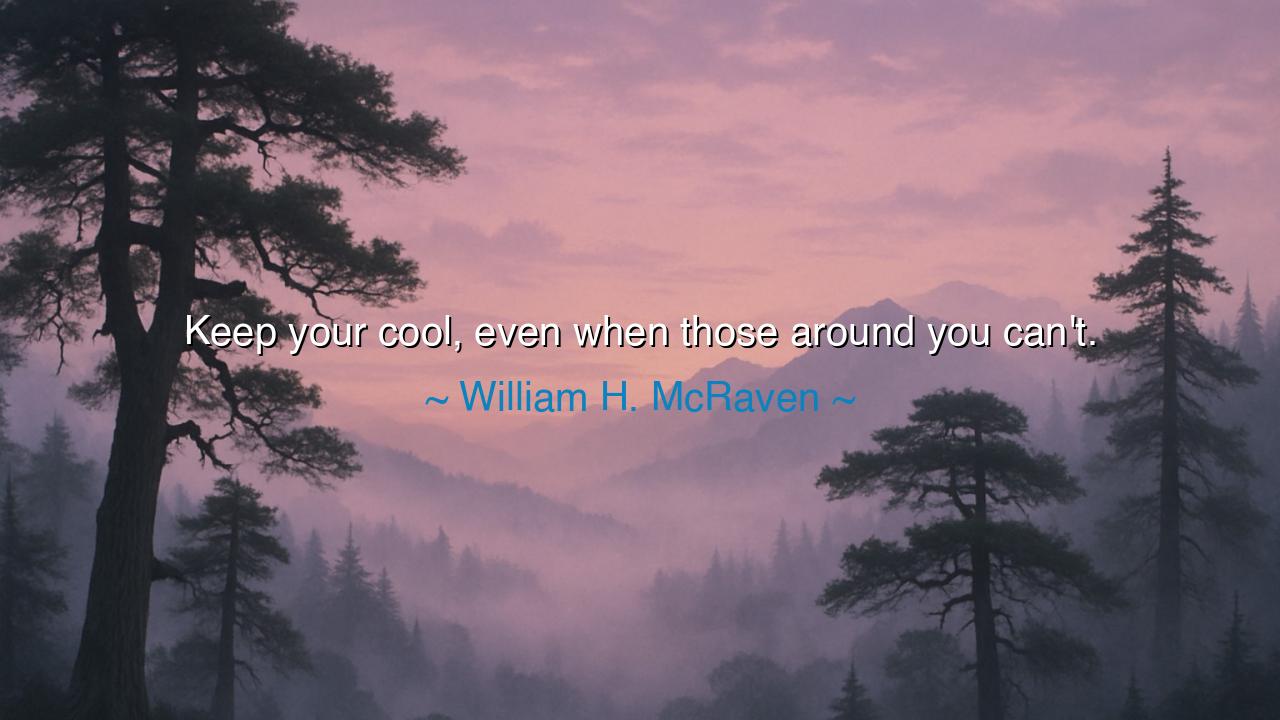
Keep your cool, even when those around you can't.






When William H. McRaven shared the wisdom, “Keep your cool, even when those around you can’t,” he spoke to a profound truth that transcends time and circumstance. In moments of chaos, confusion, or adversity, the ability to remain calm and composed is not just a display of strength, but a sign of true leadership. McRaven, a Navy SEAL and military leader, knew well the power of maintaining one’s composure in the face of overwhelming stress. To keep your cool in times of crisis is to act with clarity and purpose, guiding not just yourself, but others through the storm. This teaching is as ancient as the heroes and philosophers who once led armies and nations.
The ancients recognized the importance of self-mastery in moments of peril. Consider Socrates, whose wisdom lay not in his ability to control the external world, but in his mastery of himself. Socrates was known for his calm demeanor, even when questioned or criticized by others. In the face of death, during his trial in Athens, Socrates famously remained composed, maintaining his integrity and clarity of mind despite the impending threat. His ability to keep his cool amidst personal danger became a hallmark of his philosophy. In this way, Socrates understood that true strength does not lie in reaction, but in action, grounded in self-discipline and rational thought.
The same spirit of composure under pressure can be found in the life of Alexander the Great. On the battlefield, Alexander faced challenges that would have undone lesser leaders. But his cool-headedness in the heat of battle allowed him to make strategic decisions that led to his empire’s vast expansion. Even when his army faced impossible odds, Alexander maintained his calm, earning the respect and loyalty of his soldiers. His ability to keep his cool, to lead by example, ensured his success and legacy. Like McRaven’s advice, Alexander’s story is a reminder that leadership in times of adversity requires not just strength, but grace under pressure.
In a more modern example, consider the example set by Nelson Mandela. After years of imprisonment and countless personal hardships, Mandela emerged as a figure of incredible calm and dignity. He knew that his ability to maintain composure during the struggles of apartheid would serve as a beacon of hope to millions. Mandela’s calmness in the face of unjust oppression and his steadfastness in his principles were the very qualities that made him a hero not just in his own country, but around the world. His legacy is a testament to the power of keeping one’s cool, even when surrounded by chaos and hostility.
The act of remaining calm is not simply about suppressing emotion, but about exercising the wisdom to navigate uncertainty with grace and purpose. The ancient Chinese philosopher Laozi in the Tao Te Ching often spoke of the importance of stillness in the face of turbulence. Laozi believed that the world could be chaotic, but that inner calmness—the ability to remain still and balanced—was the key to wisdom and effective action. Much like McRaven’s words, Laozi’s teachings remind us that composure is not a passive act, but an active choice to maintain peace within ourselves, regardless of external circumstances.
McRaven’s teaching also reflects a deeper truth about leadership: those who lead do not merely instruct—they model behavior. In times of crisis, people often look to those around them for cues on how to act. If a leader loses their cool, chaos can spread like wildfire. But if a leader maintains composure, they create an environment where others can follow with confidence. This is the essence of leadership in its highest form. Composure becomes a guiding light that allows others to act with purpose instead of reacting in fear or confusion.
The lesson we take from McRaven’s words, and the ancients, is clear: keep your cool, especially when those around you cannot. This is not just about surviving difficult situations, but about thriving in them, and leading others through them. The true mark of a great leader, or a great person, is their ability to remain calm in the face of pressure. Whether in battle, in personal trials, or in the heat of an argument, composure allows us to act wisely, to make decisions that are thoughtful and just, and to lead by example.
So, in your own life, when faced with adversity or chaos, choose to remain composed. Control your thoughts, your emotions, and your reactions. This is not a denial of feeling, but an affirmation of self-mastery. When you keep your cool, you empower not only yourself but those around you. In every moment of crisis, be the steady presence that others can look to for guidance. Through calmness, you will find clarity, strength, and the ability to transform challenges into opportunities for growth. Keep your cool, for in that stillness lies the power to shape a better future.






AAdministratorAdministrator
Welcome, honored guests. Please leave a comment, we will respond soon